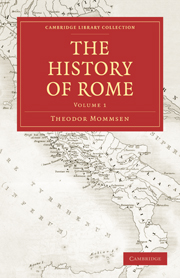Book contents
- Frontmatter
- PREFACE
- PREFATORY NOTE BY THE TRANSLATOR
- EXTRACT FROM DR. MOMMSEN'S PREFACE
- Contents
- BOOK FIRST THE PERIOD ANTERIOR TO THE ABOLITION OF THE MONARCHY
- CHAPTER I INTRODUCTION
- CHAPTER II THE EARLIEST MIGRATIONS INTO ITALY
- CHAPTER III THE SETTLEMENTS OF THE LATINS
- CHAPTER IV THE BEGINNINGS OF ROME
- CHAPTER V THE ORIGINAL CONSTITUTION OF ROME
- CHAPTER VI THE NON-BURGESSES AND THE REFORMED CONSTITUTION
- CHAPTER VII THE HEGEMONY OF ROME IN LATIUM
- CHAPTER VIII THE UMBRO-SABELLIAN STOCK—BEGINNINGS OF THE SAMNITES
- CHAPTER IX THE ETRUSCANS
- CHAPTER X THE HELLENES IN ITALY.—MARITIME SUPREMACY OF THE TUSCANS AND CARTHAGINIANS
- CHAPTER XI LAW AND JUSTICE
- CHAPTER XII RELIGION
- CHAPTER XIII AGRICULTURE, TRADE, AND COMMERCE
- CHAPTER XIV MEASURING AND WRITING
- CHAPTER XV ART
- BOOK SECOND FROM THE ABOLITION OF THE MONARCHY IN ROME TO THE UNION OF ITALY
- APPENDIX: ON THE PATRICIAN CLAUDII
- ADDITIONS AND CORRECTIONS
CHAPTER XII - RELIGION
Published online by Cambridge University Press: 05 October 2010
- Frontmatter
- PREFACE
- PREFATORY NOTE BY THE TRANSLATOR
- EXTRACT FROM DR. MOMMSEN'S PREFACE
- Contents
- BOOK FIRST THE PERIOD ANTERIOR TO THE ABOLITION OF THE MONARCHY
- CHAPTER I INTRODUCTION
- CHAPTER II THE EARLIEST MIGRATIONS INTO ITALY
- CHAPTER III THE SETTLEMENTS OF THE LATINS
- CHAPTER IV THE BEGINNINGS OF ROME
- CHAPTER V THE ORIGINAL CONSTITUTION OF ROME
- CHAPTER VI THE NON-BURGESSES AND THE REFORMED CONSTITUTION
- CHAPTER VII THE HEGEMONY OF ROME IN LATIUM
- CHAPTER VIII THE UMBRO-SABELLIAN STOCK—BEGINNINGS OF THE SAMNITES
- CHAPTER IX THE ETRUSCANS
- CHAPTER X THE HELLENES IN ITALY.—MARITIME SUPREMACY OF THE TUSCANS AND CARTHAGINIANS
- CHAPTER XI LAW AND JUSTICE
- CHAPTER XII RELIGION
- CHAPTER XIII AGRICULTURE, TRADE, AND COMMERCE
- CHAPTER XIV MEASURING AND WRITING
- CHAPTER XV ART
- BOOK SECOND FROM THE ABOLITION OF THE MONARCHY IN ROME TO THE UNION OF ITALY
- APPENDIX: ON THE PATRICIAN CLAUDII
- ADDITIONS AND CORRECTIONS
Summary
The gods.
The Roman world of gods, as we have already indicated (P. 28), was a higher counterpart, an ideal reflection, of the earthly Rome, in which the little and the great were alike reproduced with painstaking exactness. The state and the clan, the individual phenomena of nature as well as the individual operations of mind, every man, every place and object, every act even falling within the sphere of Roman law, reappeared in the Roman world of gods; and, as earthly things come and go in perpetual flux, the circle of the gods underwent a corresponding fluctuation. The tutelary spirit, which presided over the individual act, lasted no longer than that act itself: the tutelary spirit of the individual man lived and died with the man; and eternal duration belonged to divinities of this sort only in so far as similar acts and similarly constituted men and therefore spirits of a similar kind were ever coming into existence afresh. As the Roman gods ruled over the Roman community, so every foreign community was presided over by its own gods; but strict as was the distinction between the burgess and non-burgess, between the Roman and the foreign god, both foreign men and foreign divinities might be admitted by resolution of the community to the freedom of Rome, and when the citizens of a conquered city were transported to Rome, the gods of that city were also invited to take up their new abode there.
- Type
- Chapter
- Information
- The History of Rome , pp. 171 - 191Publisher: Cambridge University PressPrint publication year: 2010First published in: 1862



